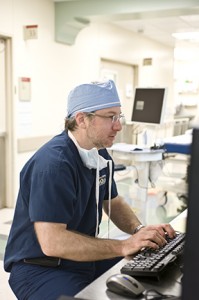Using Twitter to broadcast a live surgical procedure: educational or ethically dubious? There are obvious concerns with the practice such as the invasion of privacy or potential for error/adverse events due to the broadcast. That said, the pictures from the surgery posted on Twitter appear to have no identifying information about thepatient. HIPAA violation unlikely. Others have asked whether this creates an unnecessary/unwanted distraction in the surgical suite. Perhaps it could–but it isn’t as though the physician is typing on his Blackberry in between sutures. Arguably, the “distraction” might heighten attention to detail (don’t want to goof live!) and reduce the likelihood of medical errors. Few have talked about is the informed consent process that this 21-year-old woman went through. Presumably the consent for the surgery and the consent to have her procedure broadcast on the Internet were two different processes.
 Then there is the argument that live tweeting surgeries has educational value. According to Dr. Dong Kim, neurosurgeon at Memorial Herman Hospital in Houston TX, “Social media is a very powerful communications vehicle in helping to demystify the process of brain surgery.” That may be true for surgeons in training or kids who are considering medicine as a career, but was that really the motivation for the live tweeting? There is no doubt (in my mind) that this little stunt served a valuable PR function both for Memorial Hermann Hospital in Houston, TX and for Dr. Kim himself. Moreover, the idea that “someone may have a loved one who is considering a similar procedure and perhaps they can glean some information from this Twittercast that may help them make a decision about whether surgery is the right choice for them”, as Dr. Kim suggested, is pretty far-fetched. Picking your physician or making medical decisions based on information on Twitter? Would you ever pick a spouse or a car or anything based on the Tweets of anyone? Seems doubtful. Healthcare decision-making is too important to leave to hashtags or 140-character sentence fragments.
Then there is the argument that live tweeting surgeries has educational value. According to Dr. Dong Kim, neurosurgeon at Memorial Herman Hospital in Houston TX, “Social media is a very powerful communications vehicle in helping to demystify the process of brain surgery.” That may be true for surgeons in training or kids who are considering medicine as a career, but was that really the motivation for the live tweeting? There is no doubt (in my mind) that this little stunt served a valuable PR function both for Memorial Hermann Hospital in Houston, TX and for Dr. Kim himself. Moreover, the idea that “someone may have a loved one who is considering a similar procedure and perhaps they can glean some information from this Twittercast that may help them make a decision about whether surgery is the right choice for them”, as Dr. Kim suggested, is pretty far-fetched. Picking your physician or making medical decisions based on information on Twitter? Would you ever pick a spouse or a car or anything based on the Tweets of anyone? Seems doubtful. Healthcare decision-making is too important to leave to hashtags or 140-character sentence fragments.
That said does the hospital’s motivation matter? Does the physician’s? I’m not so sure it does. If the patient has been consented for the live tweeting, HIPAA isn’t violated, and it doesn’t turn the surgical suite into a circus, there doesn’t seem to be a good argument against it.
Frankly, I have yet to hear a concern that would seem to veto the practice outright. There are some concerns as to the limits of using this technology in surgery or other medical procedures, who should live tweet, and how often it should occur. Limiting the PR elements and focusing on the educational elements of this practice is likely to help ensure the practice doesn’t get out of hand and harm patients or their relationships with physicians and health systems.
Summer Johnson McGee, PhD